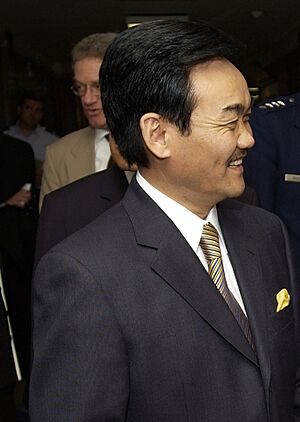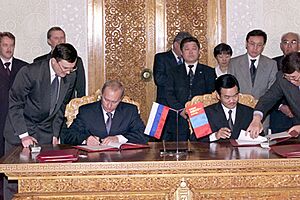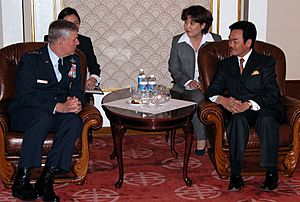Natsagiin Bagabandi facts for kids
Quick facts for kids
Natsagiin Bagabandi
|
|
|---|---|
| Нацагийн Багабанди | |

Bagabandi in 2004
|
|
| 2nd President of Mongolia | |
| In office 20 June 1997 – 24 June 2005 |
|
| Prime Minister | Mendsaikhany Enkhsaikhan Tsakhiagiin Elbegdorj Janlavyn Narantsatsralt Rinchinnyamyn Amarjargal Nambaryn Enkhbayar |
| Preceded by | Punsalmaagiin Ochirbat |
| Succeeded by | Nambaryn Enkhbayar |
| General Secretary of the Central Committee of the Mongolian People's Party | |
| In office 7 February 1997 – 6 June 1997 |
|
| President | Punsalmaagiin Ochirbat |
| Premier | Mendsaikhany Enkhsaikhan |
| Preceded by | Nambaryn Enkhbayar |
| Succeeded by | Nambaryn Enkhbayar |
| Chairman of the State Great Khural | |
| In office July 1992 – July 1996 |
|
| Preceded by | Radnaasümbereliin Gonchigdorj of Little Khural |
| Succeeded by | Radnaasümbereliin Gonchigdorj |
| Personal details | |
| Born | 22 April 1950 Yaruu, Zavkhan, Mongolian People's Republic |
| Political party | Mongolian People's Party |
| Spouse | Azadsurengiin Oyunbileg |
| Children | 2 |
Natsagiin Bagabandi (Mongolian: Нацагийн Багабанди; born 22 April 1950) is a Mongolian politician. He served as the second President of Mongolia from 1997 to 2005. He won two presidential elections, in 1997 and 2001. This made him the first Mongolian president to serve a second term.
Before becoming president, he was the Chairman of the State Great Khural (Mongolia's parliament) from 1992 to 1996. He also served as the Secretary General of the Mongolian People's Party for a short time in 1997. From 2010 to 2013 and again from 2016 to 2023, he was the first director of Oyu Tolgoi LLC, a large mining company.
Contents
Early Life and Political Beginnings
Bagabandi was born on 23 April 1950 in Zavkhan, Mongolia. He was the fifth child in a family of herders. In 1979, he joined the Mongolian People's Revolutionary Party, which is now known as the Mongolian People's Party.
He studied in different cities, including Leningrad (Russia) and Odessa (Ukraine). He specialized in food engineering. In 1987, he earned a doctorate in philosophy. In 1992, he became the Chairman of the State Great Khural, serving for four years.
In early 1997, Bagabandi became the General Secretary of his party. This was just before the presidential elections. His party had faced a tough time in the 1996 parliamentary election. They had won only 25 seats, while the Democratic Union Coalition won 50 seats.
However, Bagabandi won the 1997 presidential election. He received 62.53% of the votes. He defeated the previous president, Punsalmaagiin Ochirbat. Bagabandi became the second President of Mongolia. He was also the first president elected from his party. He won re-election in 2001 with 59.19% of the votes. He was the first Mongolian president to win a second term.
Presidency (1997-2005)
Challenges in Government
During his first four years as president, Mongolia faced some political challenges. There were frequent changes in prime ministers and government issues. His first Prime Minister, Mendsaikhany Enkhsaikhan, resigned in 1998.
The parliament then elected Tsakhiagiin Elbegdorj as Prime Minister. However, Elbegdorj lost a vote of no confidence later that year. President Bagabandi rejected several other candidates for Prime Minister. During this time, a well-known Member of Parliament, Sanjaasürengiin Zorig, was sadly assassinated in October 1998. His case remains unsolved.
Eventually, Janlavyn Narantsatsralt became Prime Minister in late 1998. But he also had to resign in 1999. Rinchinnyamyn Amarjargal then served as Prime Minister until the 2000 parliamentary elections.
In the 2000 elections, Bagabandi's party won a huge victory. They secured 72 out of 76 seats in the parliament. Nambaryn Enkhbayar, the party chairman, became the Prime Minister. He later succeeded Bagabandi as president in 2005.
Strengthening Foreign Relations
President Bagabandi worked to strengthen Mongolia's relationships with other countries. On 13 November 2000, Vladimir Putin, the President of Russia, visited Mongolia. This was a very important visit. It helped make the relationship between Mongolia and Russia stronger. They signed the Ulan Bator Declaration, which lowered the price of Russian fuel for Mongolia.
On 29 September 2003, President Bagabandi spoke at the United Nations General Assembly. He supported reforms in the UN. He also spoke about creating nuclear-weapon-free zones.
During his presidency, the relationship between the United States and Mongolia also grew stronger. Many important visits and meetings took place. On July 15, 2004, President Bagabandi visited the United States. He met with then-President George W. Bush. They talked about fighting global terrorism, promoting democracy, and increasing trade. He also visited the Pentagon, the headquarters of the U.S. Department of Defense.
Peacekeeping Efforts
Under President Bagabandi's leadership, Mongolia greatly improved its ability to participate in peacekeeping missions. He ordered the newly formed 150th Peacekeeping Battalion to prepare for these missions.
After the September 11 attacks in 2001, Mongolia supported the "Coalition of the willing" in the 2003 Iraq Invasion. Mongolia showed strong commitment to peacekeeping, even though it is a smaller country. This was the first time the Mongolian Armed Forces were actively deployed in the 21st century.
Personal Life
Natsagiin Bagabandi is married and has two children. After his time as president, he became less involved in daily politics. He has published several books about meditation and philosophy. These books are called "Crown Words" (Mongolian: Титэм Үгс).
Awards and Honors
Bagabandi Natsag has received many awards and honors:
| Country or Institution | Award | Date |
|---|---|---|
| Order of Genghis Khan | 13 July 2011 | |
| Order of Sukhbaatar | 13 September 2006 | |
| Grand Cross of the Hungarian Order of Merit | 2005 | |
| Order of Friendship | 19 April 2000 | |
| Medal "70 Years of the Mongolian People's Revolution" | 1991 |
Honorary Degrees
He has also received honorary doctorates from several universities:
| Country | School | Degree | Date |
|---|---|---|---|
| Indiana University Bloomington | Honorary Doctorate | 2005 | |
| National Academy of Governance | Honorary Doctorate | 1999 | |
| Senshu University | Honorary Doctorate | 1998 | |
| Ankara University | Honorary Doctorate | 1998 | |
| Abai Kazakh National Pedagogical University | Honorary Doctorate | 1998 | |
| Odesa National Academy of Food Technologies | Honorary Doctorate | 1995 |
Works
- "Address to UN General Assembly", 29 September 2003
See also
 In Spanish: Natsagiin Bagabandi para niños
In Spanish: Natsagiin Bagabandi para niños
 | Aurelia Browder |
 | Nannie Helen Burroughs |
 | Michelle Alexander |



